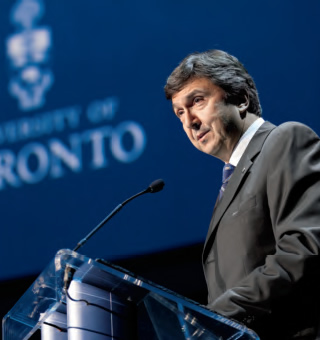As dean of the Faculty of Medicine, I used to walk each day along a photo gallery of past deans. One of them was a bewhiskered fellow named Norman Bethune, whose tenure had occurred in the 1850s. Several decades later, his grandson and namesake – also a U of T medicine graduate – became and remains famous for his service in China with the army of Mao Zedong. Today, I suspect that Bethune’s recognition may be rivalled by another U of T alumnus, Mark Rowswell – the television celebrity known as Dashan.
The ties between the University of Toronto and the Asia-Pacific region are long-standing and strong. As early as the first decades of the 20th century, Chinese students arrived at U of T in search of a great education. A young man named Suat Chwan Yin, born in the southeast Chinese city of Xiamen, was one of the first, graduating from the Faculty of Medicine in 1903.
This academic year, more than 4,100 young people from China are studying at U of T – representing about 40 per cent of our international students. We have student-exchange agreements with nine Chinese universities and more general co-operation agreements with at least 20 institutions. The number of joint research initiatives continues to grow. For example, U of T researchers are collaborating with colleagues at Peking University to develop new ways of treating diabetes. In another intriguing joint venture, U of T students in political science can sign up for a summer-abroad course in international relations that’s taught by professors both here and at Fudan University in Shanghai; it includes a three-week visit to China.
Our ties, moreover, extend right across the Asia-Pacific region. We have a long history – and extraordinary alumni connections, along with strong academic relationships – in both Hong Kong and Singapore. Korean and Japanese universities remain pivotal partners. Korea stands second, after China, in the number of international students it sends to U of T. And our relations with Taiwan are also deepening steadily.
Why is U of T so interested in establishing closer ties with Asia? We believe that doing so will be vital to the future success of the university – and to Canada. It is increasingly clear that the map of global economic impact, creativity, excellence, entrepreneurship and innovation is dominated by a small number of large and influential urban regions. In south Asia, one thinks of Mumbai and Delhi, as well as smaller centres of innovation such as Hyderabad and Bangalore. But the number of urban hubs of influence is growing faster in east Asia than anywhere else on the planet. As these urban regions become increasingly connected to each other, more and more people who live in them are themselves becoming transnational. They are educated abroad and they live abroad, often acquiring an international spouse and another citizenship. Future leaders from these regions who have attended U of T will retain mutually advantageous connections to the university and to Canada.
This new reality of global collaboration and transnational people is vital if we are to confront humanity’s shared challenges. No single jurisdiction can take on borderless and complex issues such as global epidemics, climate change or cyber-security. We recognize this reality at U of T: institutions are only as good as their people and their partners. The same is true of global urban regions, such as Metropolitan Toronto.
The Toronto region is particularly fortunate because it is a magnet for immigrants and, increasingly, international students. We therefore have a chance to leverage our proximity to the U.S. (today’s biggest economy) while improving our connections with the economic superpowers of tomorrow. Above all, we can help educate successive generations of remarkably skilled and mobile young people who will be as happy in the great cities of east and south Asia, as they are in the Toronto region. For one, I hope that these global citizens will make the world more secure, stable and sustainable than it now is. That, among other reasons, is why I also hope that the relationship between U of T and our academic partners and alumni in Asia will continue to thrive, and serve as a model for global co-operation and synergy in the decades ahead.
Sincerely,
David Naylor






